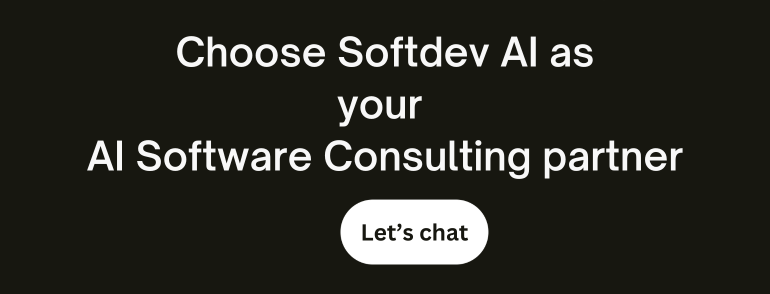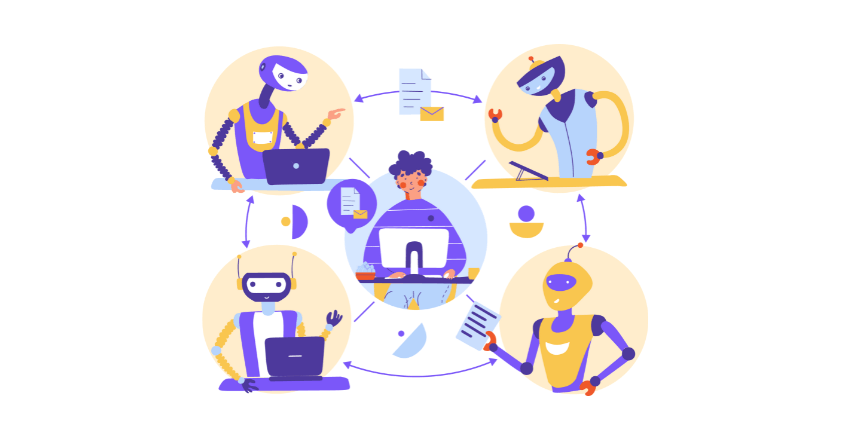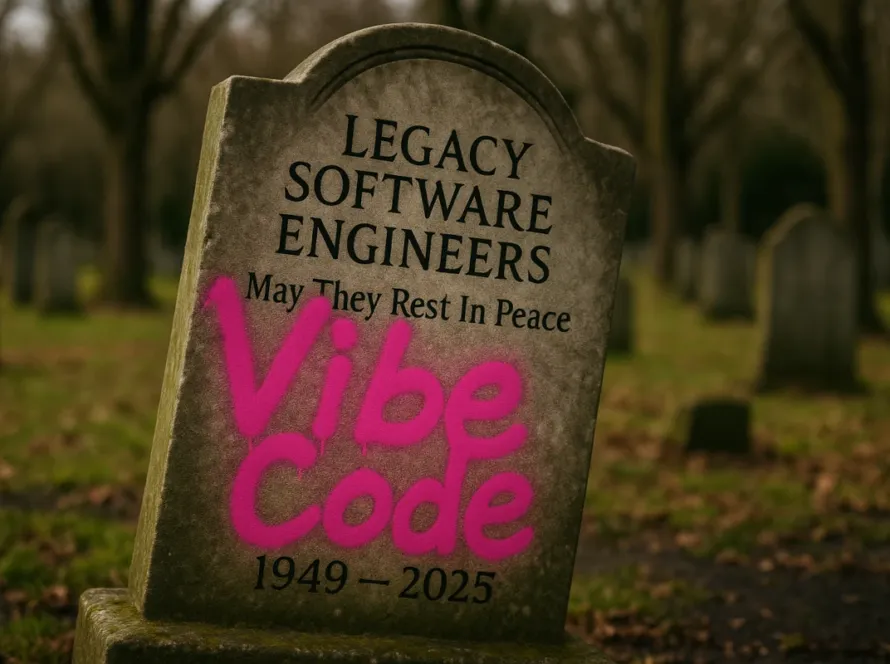AI is changing the way businesses work, and software teams are feeling the pressure to keep up. Whether you’re building a new AI-powered tool or adding machine learning to an existing system, you might be thinking about hiring an AI consultant. But how do you find the right person? What skills should they have? And how can you make sure they actually help your team succeed?
What Is an AI Consultant?
An AI consultant is an expert who helps companies plan, build, and improve artificial intelligence systems. They don’t just code they also advise on the best AI strategies, choose the right tools, and make sure projects stay on track.
Some AI consultants work independently, while others are part of consulting firms. Some focus on specific industries, like healthcare or finance, while others have general AI knowledge that can apply to many fields.
Why Would a Software Team Need an AI Consultant?
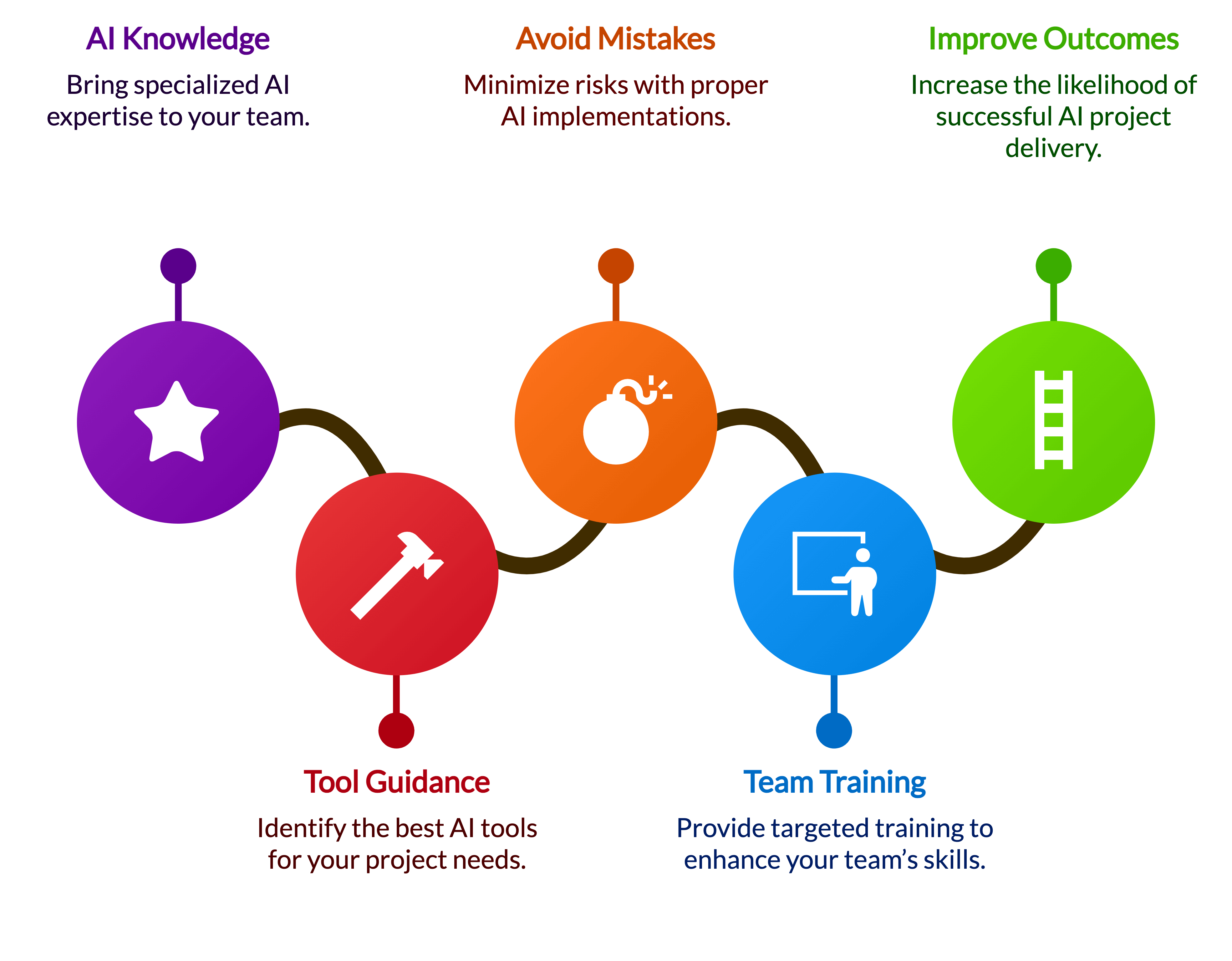
If your team already has software developers, you might wonder why you need an AI consultant at all. Here are a few key reasons:
1. Your Team Lacks AI Expertise
Most software engineers are great at coding, but AI is a whole different skill set. It involves machine learning, data science, and sometimes deep learning. If your team doesn’t have experience with AI, an expert can help you avoid costly mistakes.
2. You Need Help Choosing the Right AI Tools
There are hundreds of AI tools out there. Some are open-source, some require a paid subscription, and some need special hardware to run. An AI consultant can help you pick the right tools for your project.
3. You Want to Avoid Wasting Time and Money
Building AI systems takes time. If your team experiments with the wrong approaches, you could waste months (or even years) on something that won’t work. A consultant can help you stay focused and avoid dead ends.
4. You Need Help with AI Ethics and Compliance
AI is powerful, but it also comes with risks. Bias, privacy issues, and security threats can cause big problems if not handled properly. A consultant can guide your team on ethical AI development and make sure you follow regulations.
Key Skills to Look for in an AI Consultant
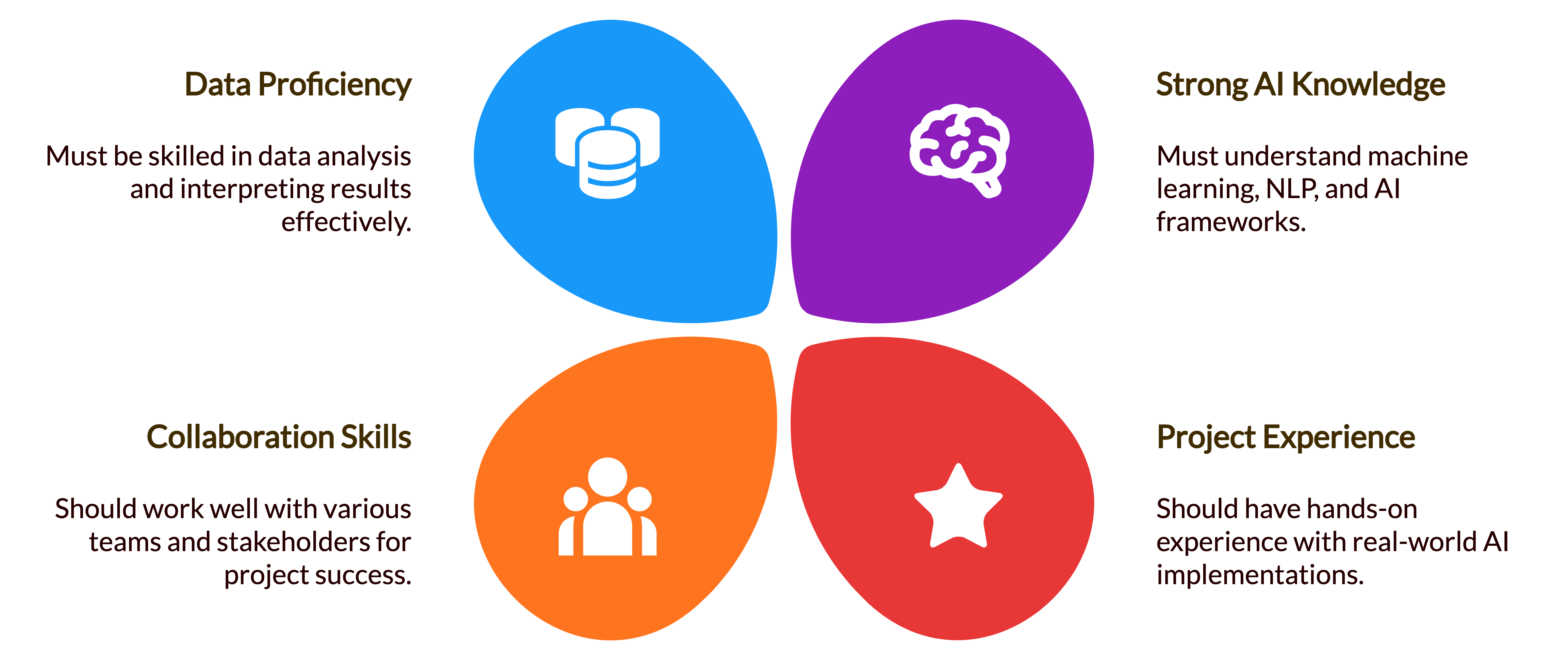
Not all AI consultants have the same skills. Some specialize in certain areas, while others have a broad knowledge of AI. When hiring, look for these key skills:
1. Strong AI and Machine Learning Knowledge
Your consultant should understand machine learning, deep learning, and natural language processing (NLP). They should also be familiar with AI frameworks like TensorFlow, PyTorch, and Scikit-Learn.
2. Experience with Real-World AI Projects
The best AI consultants have hands-on experience. They should be able to show examples of past AI projects and explain their role in them.
3. Data Science and Analytics Skills
AI relies on data. Your consultant should know how to clean, process, and analyze large datasets. They should also understand different types of data models and when to use them.
4. Knowledge of AI Ethics and Regulations
AI can create problems if not handled correctly. Look for a consultant who understands AI bias, privacy laws, and security risks.
5. Ability to Communicate with Non-Technical Teams
Your AI consultant should be able to explain complex topics in simple terms. They need to communicate well with software developers, managers, and executives.
How to Find and Hire the Right AI Consultant
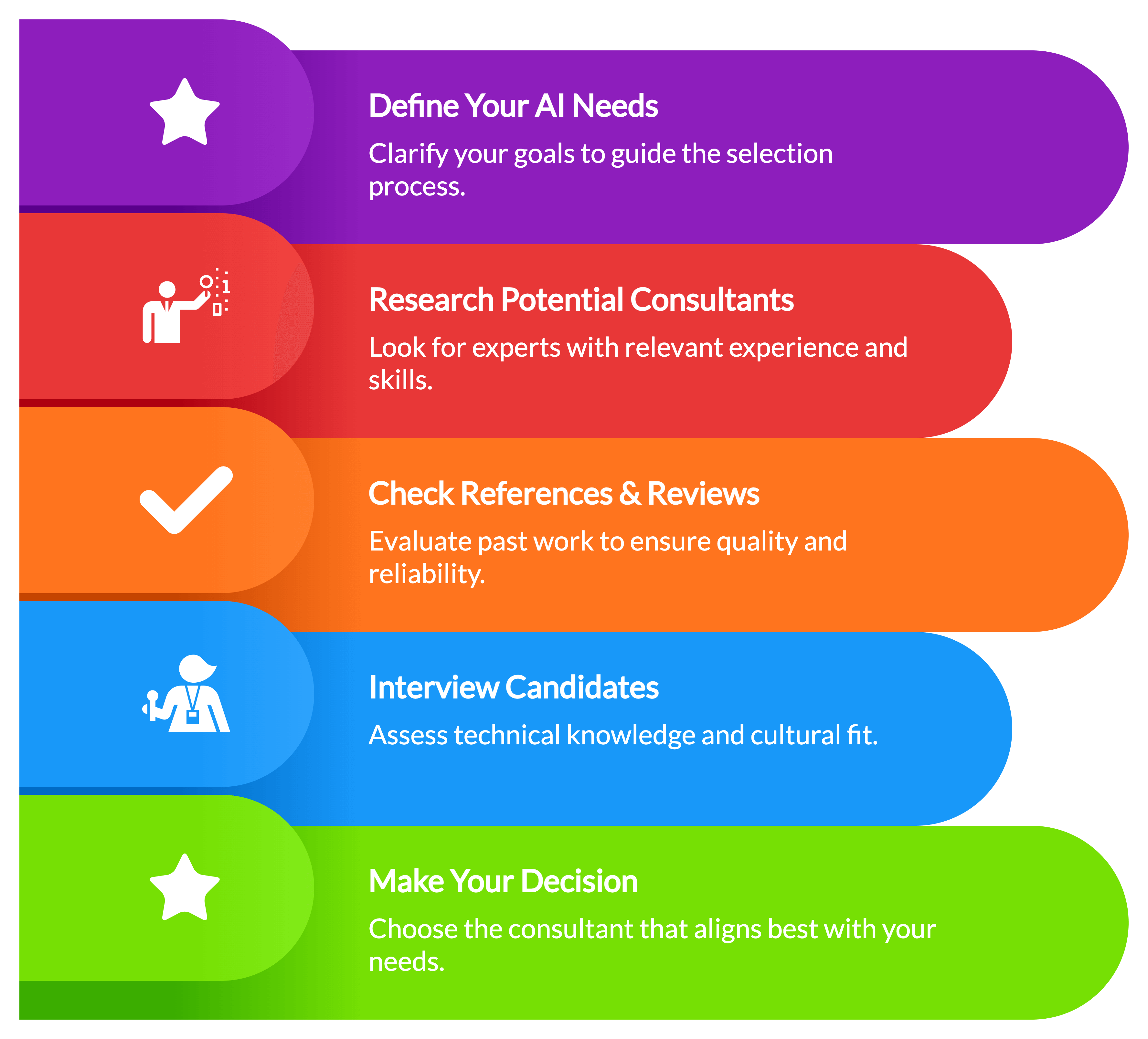
Finding the right AI consultant isn’t easy. Here’s a step-by-step process to help you hire the best one for your team.
Step 1: Define Your AI Needs
Before you start looking, be clear about what you need. Ask yourself:
- Are you building an AI-powered product from scratch?
- Do you need help improving an existing AI system?
- Are you looking for guidance on AI strategy and planning?
Once you know what you need, you’ll have an easier time finding the right consultant.
Step 2: Search in the Right Places
You can find AI consultants on:
- Freelance websites like Upwork and Toptal
- LinkedIn and AI-focused networking groups
- Consulting firms that specialize in AI
- AI conferences and meetups
Step 3: Check Their Portfolio and Reviews
A good AI consultant should have a portfolio of past work. Look at their previous projects and see if they align with your needs. Also, check reviews or ask for references from past clients.
Step 4: Ask the Right Interview Questions
When interviewing a consultant, ask questions like:
- What AI projects have you worked on before?
- What tools and frameworks do you use?
- How do you handle AI bias and ethical concerns?
- Can you explain a complex AI concept in simple terms?
- How do you stay up to date with AI trends?
Step 5: Start with a Small Project
If possible, start with a small test project before committing to a long-term contract. This will help you see how well they work with your team and if they deliver good results.
Common Mistakes to Avoid When Hiring an AI Consultant
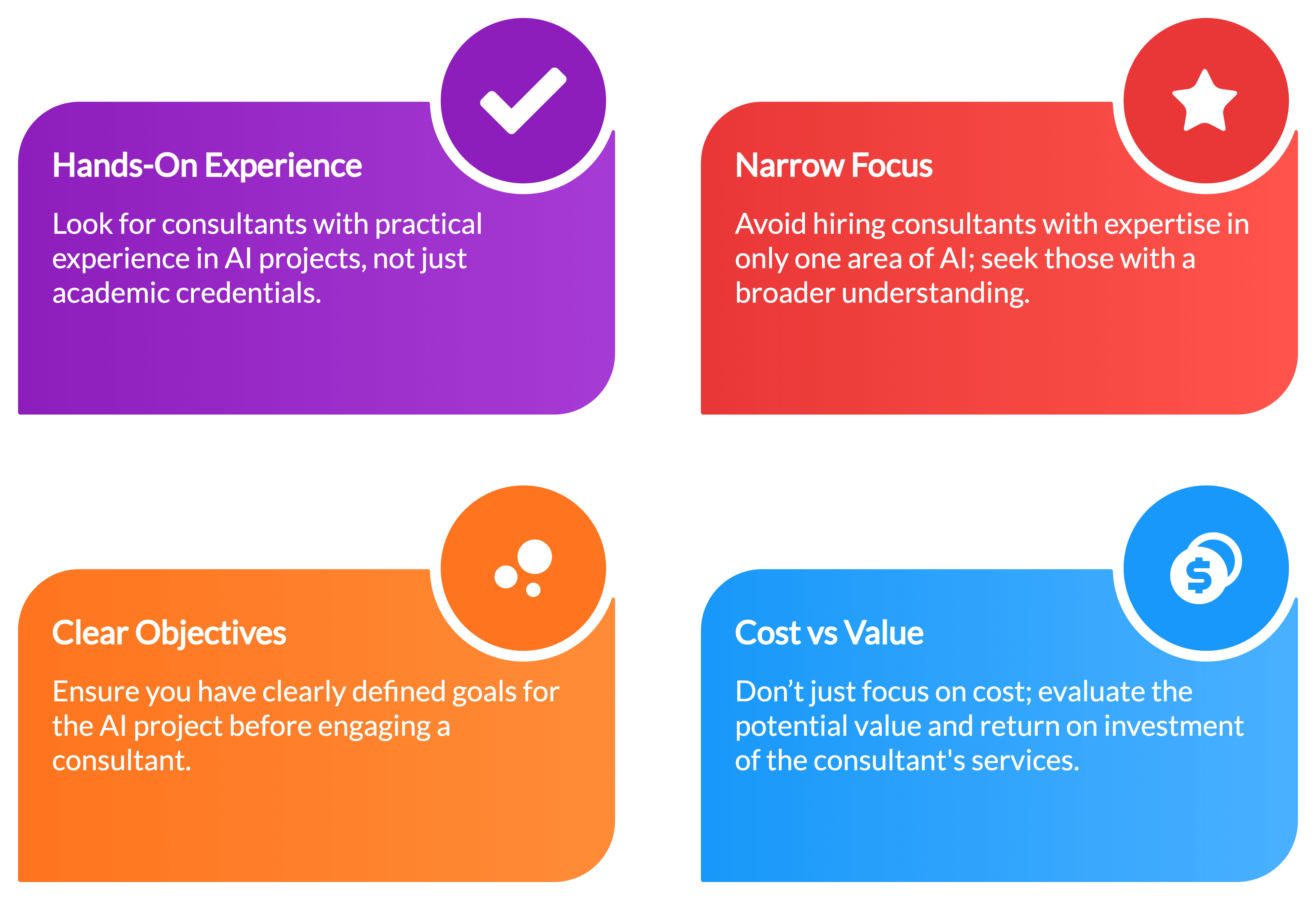
Hiring the wrong AI consultant can cost your company time, money, and even your project’s success. AI is a complex field, and not every consultant has the right mix of skills and experience to meet your needs. Below are some of the most common mistakes companies make when hiring an AI consultant—and how to avoid them.
1. Hiring Someone Without Hands-On Experience
Many AI consultants have impressive resumes filled with academic credentials, research papers, and theoretical knowledge. However, AI in the real world is different from AI in a research lab.
Why This Is a Problem:
Someone who only understands AI in theory might struggle when it comes to actually building, testing, and deploying an AI system in a production environment. Real-world AI projects require experience with messy datasets, unexpected errors, scalability challenges, and business constraints that a purely academic background doesn’t always prepare someone for.
How to Avoid It:
- Look for consultants with hands-on experience in AI development.
- Ask for case studies, portfolio examples, or references from past clients.
- If possible, have them walk you through a past project and explain their role in building and implementing it.
2. Choosing Someone Who Can’t Communicate Well
AI is a highly technical field, but most of the people in your company—including managers, executives, and stakeholders—are not AI experts. Your consultant needs to be able to bridge the gap between complex AI concepts and practical business applications.
Why This Is a Problem:
A consultant who can’t communicate clearly may struggle to explain their ideas, justify their recommendations, or get buy-in from leadership. They may also fail to train your team properly, leaving your developers confused about how to maintain or expand the AI system after the consultant leaves.
How to Avoid It:
- During the interview process, ask them to explain a complex AI concept in simple terms. If they can’t break it down in an understandable way, they may not be a good fit.
- Look for a consultant who has experience working with non-technical teams or providing training.
- Consider their written communication skills, as AI documentation and reporting are also important parts of the job.
3. Ignoring AI Ethics and Compliance
AI is powerful, but it also comes with risks. Issues like biased algorithms, privacy concerns, and security threats can harm users and even lead to legal trouble if not handled correctly. AI regulations are also becoming stricter, with laws like the EU AI Act and GDPR requiring companies to follow ethical AI practices.
Why This Is a Problem:
If your AI system makes decisions based on biased data, it can lead to unfair treatment of customers or employees. For example, AI in hiring software has been found to discriminate against certain candidates. Similarly, AI systems that process personal data need to comply with privacy laws, or your company could face fines and lawsuits.
How to Avoid It:
- Choose an AI consultant who understands AI ethics, bias mitigation, and regulatory compliance.
- Ask how they ensure fairness and transparency in AI models.
- Look for consultants who have worked in regulated industries like healthcare or finance, as they are more likely to be familiar with compliance standards.
4. Rushing the Hiring Process
AI consultants are in high demand, and it can be tempting to hire the first qualified person you come across. However, making a rushed decision can lead to hiring someone who isn’t the right fit for your project.
Why This Is a Problem:
Hiring too quickly can result in skill mismatches, poor communication, or misaligned expectations. If the consultant doesn’t understand your business needs or lacks the right technical expertise, you may have to start over—wasting time and money.
How to Avoid It:
- Take the time to interview multiple candidates and compare their experience, skills, and approach.
- Clearly define your AI project goals before hiring, so you can match them with the consultant’s expertise.
- If possible, start with a small pilot project to test their capabilities before committing to a long-term contract.
Avoiding these common mistakes can help you hire an AI consultant who adds real value to your team. Look for practical experience, strong communication skills, ethical awareness, and a thoughtful hiring process to ensure your project succeeds. Taking the time to find the right fit will save you from costly setbacks and help you get the most out of AI in your business.
Hiring an AI consultant can help your software team build better AI solutions, avoid mistakes, and stay ahead of the competition. But finding the right consultant takes time and effort.
Focus on experience, technical skills, and communication abilities when making your choice.

